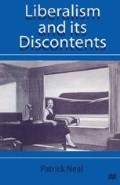Abstract
Assuming that the argument of the previous chapter is correct, a puzzle arises. If it is indeed a relatively straightforward path of argument that leads to the conclusion that liberalism is not neutral with regard to the question of the good life, then why do so many liberals remain convinced that it is?1 Why, when liberals and their critics debate the issue of neutrality, do they so often seem to talk beyond one another? It seems to me that instances of these debates ought to come off better than they do, and in this essay I attempt to describe how they might. Leaving aside the consequences of state action and inaction in relation to the ideal of neutrality, I focus instead upon the two-tiered structure of liberal thinking about the idea of the good and the ideal of neutrality. My claim is that this structure inclines liberals to subtly but powerfully distort the nature of non-liberal ideals through the way in which the notion of “conceptions of the good” is itself conceptualized.
Access this chapter
Tax calculation will be finalised at checkout
Purchases are for personal use only
Preview
Unable to display preview. Download preview PDF.
Notes
One liberal who does not endorse neutrality is William Galston, “Defending Liberalism,” American Political Science Review, vol. 76 (1982), pp. 621–9.
See, for example, Ronald Dworkin, “Liberalism,” in S. Hampshire, ed., Public and Private Morality (Cambridge: Cambridge University Press, 1978), pp. 113–42.
On perfectionism, see John Rawls, A Theory of Justice (Cambridge, Mass.: Harvard University Press 1971), pp. 325–32.
Ronald Dworkin, Taking Rights Seriously (Cambridge, Mass.: Harvard University Press 1977), pp. 231–9.
These criticisms are developed at length in Rawls, A Theory of Justice and Robert Nozick, Anarchy, State and Utopia (New York: Basic Books, 1974).
A variation on the idea of shared relations and its significance within the liberal-communitarian debate is presented in Patrick Neal and David Paris, “Liberalism and the Communitarian Critique: A Guide for the Perplexed,” Canadian Journal of Political Science, vol. 23, no. 3 (September, 1990), pp. 419–39.
See, in this regard, D.J.C. Carmichael, Agent-Individualism: A Critique of the Logic of Liberal Political Understanding (Ph.D. Dissertation, University of Toronto, 1978).
Thomas Hobbes, Leviathan, C.B. Macpherson, ed. (Harmondsworth: Penguin Books, 1968), Pt. I, ch. 15, p. 216.
Author information
Authors and Affiliations
Copyright information
© 1997 Patrick Neal
About this chapter
Cite this chapter
Neal, P. (1997). A Liberal Theory of the Good?. In: Liberalism and Its Discontents. Palgrave Macmillan, London. https://doi.org/10.1007/978-1-349-14362-7_3
Download citation
DOI: https://doi.org/10.1007/978-1-349-14362-7_3
Publisher Name: Palgrave Macmillan, London
Print ISBN: 978-1-349-14364-1
Online ISBN: 978-1-349-14362-7
eBook Packages: Palgrave Political & Intern. Studies CollectionPolitical Science and International Studies (R0)

